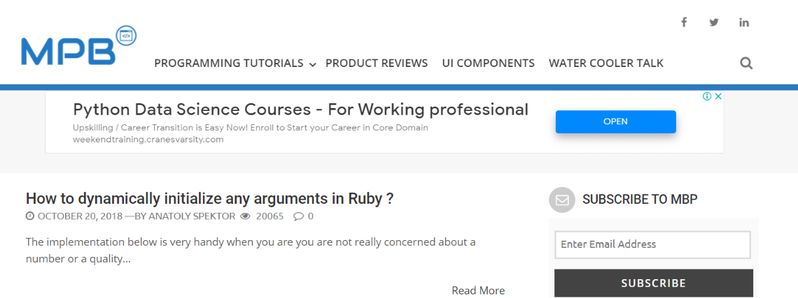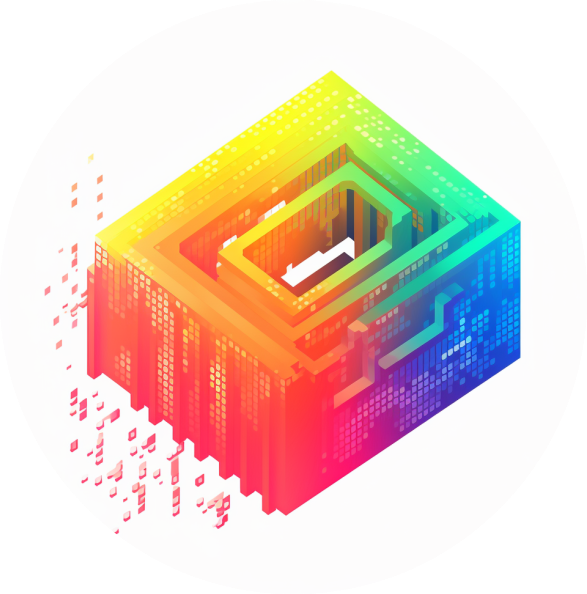This article presents a curated list of 13 esteemed blogs and websites that serve as valuable resources for individuals seeking to enhance their coding skills. These platforms cover a diverse range of programming topics and languages, catering to both beginners and advanced readers alike. Noteworthy mentions include Better Programming, Lynda, David Walsh Blog, CSS Tricks, and NSHipster. In addition to sharing valuable tips for programming beginners, such as the significance of starting with the basics and finding a programming buddy, the content also emphasizes the importance of learning through practice. Moreover, it highlights the benefits of running a programming blog, from enhancing technical proficiency to creating a personal brand and effectively expressing ideas. Ultimately, the article concludes by underscoring the significance of continuous coding practice and recommends following the listed blogs and websites to foster ongoing improvement in programming skills. Let’s delve into the world of codes and explore these valuable resources together.
Blogs and Websites for Beginner Programmers
When starting the journey in programming, it is essential to have reliable resources that provide guidance and support. Here are five blogs and websites that are highly recommended for beginner programmers.
Better Programming
Better Programming is a popular platform that provides a wide range of articles and tutorials on programming. They cover various programming languages, including Python, Java, and JavaScript, making it an ideal resource for beginners looking to learn the basics. The platform offers comprehensive guides, code examples, and practical tips to help beginners grasp programming concepts effectively.
Lynda
Lynda is an online learning platform that offers courses on programming and various other subjects. With Lynda, beginners can access a vast library of video tutorials, allowing them to learn at their own pace. The platform offers courses on numerous programming languages, web development, and software development, making it an excellent resource for beginners looking for a structured learning experience.
Codecademy
Codecademy is a well-known online learning platform designed specifically for coding beginners. It offers interactive coding exercises and projects, allowing beginners to learn by doing. Codecademy provides courses in various programming languages and technologies, teaching fundamental programming concepts and helping beginners build a solid foundation. The platform also offers a supportive community for learners, providing a space for questions and discussions.
freeCodeCamp
freeCodeCamp is a nonprofit organization that offers a free online curriculum for learning programming and web development. The platform provides a comprehensive learning path for beginners, covering HTML, CSS, JavaScript, and more. Through coding challenges and projects, freeCodeCamp helps beginners gain hands-on experience and build a portfolio of projects to showcase their skills. Additionally, the platform has an active community forum where beginners can seek help, share their progress, and connect with like-minded learners.
The Odin Project
The Odin Project is an open-source curriculum that focuses on teaching full-stack web development. It provides a step-by-step guide for beginners, covering everything from HTML and CSS to Ruby on Rails and JavaScript. The Odin Project encourages hands-on learning through projects, allowing beginners to apply their knowledge in real-world scenarios. With its emphasis on practical skills, The Odin Project equips beginners with the tools and knowledge necessary to start their coding journey confidently.
Blogs and Websites for Advanced Programmers
For advanced programmers who are looking to expand their skills and stay up-to-date with the latest trends in programming, here are five blogs and websites that provide insightful and in-depth content.
David Walsh Blog
The David Walsh Blog is a valuable resource for advanced programmers, offering tutorials, tips, and tricks for front-end development and JavaScript. With its focus on cutting-edge techniques and coding best practices, the blog provides advanced programmers with the knowledge and inspiration to take their skills to the next level. David Walsh, the author, is a respected developer in the industry, lending credibility and expertise to the content.
CSS Tricks
CSS Tricks is a highly regarded blog that covers all aspects of CSS and front-end development. It offers tutorials, case studies, and practical examples, catering to advanced programmers who want to refine their CSS skills. The blog explores complex CSS concepts, such as responsive design, animations, and layout techniques, providing insightful explanations and code snippets. With its wealth of content and community forums, CSS Tricks is a valuable resource for advanced programmers seeking to master CSS.
NSHipster
NSHipster is primarily aimed at advanced iOS and macOS developers, providing in-depth articles and tutorials on Objective-C and Swift programming. The blog delves into lesser-known features and APIs, offering advanced programming techniques for Apple platforms. NSHipster is known for its technical accuracy and attention to detail, making it a trusted resource for experienced Apple developers looking to enhance their skills and stay updated with the latest iOS and macOS advancements.
Smashing Magazine
Smashing Magazine is a comprehensive web development resource that covers a wide range of topics, from front-end design to back-end development. It offers articles, tutorials, and case studies written by industry experts, allowing advanced programmers to deep-dive into specific areas of interest. Smashing Magazine provides in-depth content on topics like accessibility, performance optimization, and user experience, equipping advanced programmers with the knowledge and tools to create exceptional web experiences.
SitePoint
SitePoint is a well-established platform that provides tutorials, books, and courses on various programming topics. It caters to both beginner and advanced programmers, offering in-depth content on front-end and back-end development, design, and project management. SitePoint’s articles and tutorials are written by industry professionals, ensuring a high standard of quality. Advanced programmers can benefit from SitePoint’s advanced-level tutorials and guides, covering topics like advanced JavaScript, API development, and database management.

Starting with the Basics
When diving into programming, beginners must establish a strong foundation by starting with the basics. Here are three key aspects that beginners should focus on.
Learning a Programming Language
The first step for beginner programmers is to choose a programming language to learn. Popular options for beginners include Python, JavaScript, and Ruby. It is important to select a language that aligns with personal goals and interests. Once a language is chosen, beginners should dedicate time to understanding its syntax, data types, and control structures. A solid understanding of a programming language forms the basis for further learning and allows beginners to write simple programs.
Understanding Syntax and Logic
Programming is all about translating ideas into instructions that a computer can understand. Understanding the syntax and logic of a programming language is crucial for beginners to write correct and functional code. Syntax refers to the rules and structure of a programming language, while logic encompasses how statements and data flow within a program. Beginners should spend time practicing writing code and familiarizing themselves with the syntax and logic of their chosen programming language.
Practicing Simple Coding Exercises
To reinforce learning and gain confidence in programming, beginners should practice simple coding exercises. These exercises can involve solving small problems or implementing basic algorithms. Platforms like Codecademy and freeCodeCamp offer interactive coding challenges for beginners to practice their skills. By regularly engaging in these exercises, beginners can solidify their understanding of concepts and develop problem-solving skills, essential for more complex programming tasks.
Finding a Programming Buddy
Learning to code does not have to be a solitary experience. Finding a programming buddy can greatly enhance the learning journey and provide valuable support along the way. Here are some benefits of having a programming buddy and online platforms to find one.
Benefits of Having a Programming Buddy
Having a programming buddy offers several advantages for beginners. It fosters motivation and accountability, as both individuals encourage and challenge each other to stay committed to learning. A programming buddy also provides a fresh perspective, allowing beginners to gain new insights and approaches to problem-solving. Additionally, a programming buddy can serve as a source of support and encouragement during difficult moments, helping beginners overcome obstacles and stay motivated.
Online Platforms to Find Programming Buddies
Several online platforms cater to individuals seeking programming buddies. Codecademy, freeCodeCamp, and Reddit’s “r/programmingbuddies” are popular options. These platforms typically have sections where individuals can connect with like-minded learners and find programming buddies with similar skill levels and learning goals. Online programming communities and forums also provide a space for beginners to seek advice, share progress, and engage in collaborative learning.
Collaborative Coding and Learning
Once a programming buddy is found, beginners can engage in collaborative coding and learning. This can involve working on coding projects together, solving problems as a team, or discussing programming concepts and best practices. Collaborative coding not only enhances learning but also fosters creativity and teamwork, skills that are highly valued in the programming industry. Beginners can leverage their programming buddy’s expertise and learn from each other’s strengths, accelerating their learning progress.

Learning by Practicing
Practice is a fundamental aspect of mastering any skill, and programming is no exception. Here are two effective ways beginners can learn programming through practice.
Building Small Projects
Building small projects is an excellent way for beginners to apply their programming knowledge and gain hands-on experience. By developing simple applications, such as calculators or to-do lists, beginners can practice implementing concepts they have learned. Small projects provide a tangible output, boosting confidence and offering opportunities for self-reflection and improvement. Online platforms like freeCodeCamp and The Odin Project offer project-based learning paths for beginners, providing step-by-step guidance in building real-world applications.
Participating in Coding Challenges
Coding challenges are a popular way for beginners to practice their programming skills and problem-solving abilities. Platforms like LeetCode, HackerRank, and Codeforces offer a wide range of coding challenges of varying difficulty levels. These challenges prompt beginners to tackle diverse problems and find efficient solutions within a given time constraint. Participating in coding challenges not only sharpens programming skills but also exposes beginners to different problem domains and algorithms, expanding their knowledge and critical thinking abilities.
Contributing to Open Source Projects
Contributing to open source projects is an excellent way for beginners to gain practical experience and contribute to the broader programming community. Open source projects allow beginners to collaborate with experienced programmers, learn from their expertise, and improve their skills. By fixing bugs, adding features, or improving documentation, beginners can make meaningful contributions while learning from real-world projects. Platforms like GitHub provide extensive repositories of open source projects, offering opportunities for beginners to start contributing to their favorite projects.
Benefits of Running a Programming Blog
Running a programming blog not only benefits the audience but also provides numerous advantages for the blogger. Here are three notable benefits of running a programming blog.
Enhancing Technical Skills
Running a programming blog requires continuously creating and sharing content, which in turn enhances the blogger’s technical skills. To write valuable articles and tutorials, bloggers must delve into programming concepts, explore new technologies, and conduct thorough research. By constantly expanding their knowledge and understanding, bloggers sharpen their technical skills and gain a deeper understanding of programming principles. Explaining complex concepts in a clear and concise manner also reinforces the blogger’s understanding of the subject matter.
Creating a Brand
A programming blog offers bloggers a platform to establish and grow their personal brand in the programming community. By consistently producing high-quality content, bloggers build credibility and expertise in their niche. This can lead to recognition from peers and industry professionals, opening doors to various opportunities such as speaking engagements, collaborations, or job offers. A strong personal brand also sets bloggers apart from the competition and increases their visibility in the programming industry.
Developing Communication Skills
Effective communication is a valuable skill for programmers, as it allows them to articulate their ideas and collaborate effectively. Running a programming blog provides an opportunity for bloggers to develop their communication skills, both written and verbal. Bloggers must convey technical concepts in a clear and concise manner, making them accessible to readers with varying levels of expertise. Engaging with readers through comments and discussions further hones their ability to explain ideas and respond to feedback constructively.
Sharing and Receiving Feedback
A programming blog fosters a community of learners, allowing bloggers to share their knowledge and receive feedback from readers. By sharing their coding experiences, challenges, and solutions, bloggers provide insights and inspiration for other programmers. The feedback received from readers can be invaluable, helping bloggers refine their understanding, correct misconceptions, and improve their writing style. The exchange of ideas and feedback in the programming community fosters continuous learning and growth for both bloggers and readers.

Enhancing Technical Skills
Technical skills are the cornerstone of a successful programming career. Here are three ways programmers can enhance their technical skills.
Learning New Programming Concepts and Techniques
Programming is a rapidly evolving field, and staying up-to-date with new concepts and techniques is crucial for advanced programmers. By continuously learning and exploring new ideas, programmers can expand their knowledge and adapt to changing industry trends. Platforms like Better Programming and Smashing Magazine offer articles and tutorials that delve into advanced programming concepts, providing programmers with the resources to deepen their understanding and broaden their skillset.
Exploring Advanced Programming Topics
Advanced programmers can challenge themselves by exploring more complex programming topics. This can involve diving deeper into a specific programming language, such as mastering advanced Python features or understanding the intricacies of functional programming. Alternatively, programmers can expand their knowledge by exploring other programming paradigms, like learning about microservices architecture or machine learning algorithms. By immersing themselves in advanced programming topics, programmers can expand their horizons and become well-rounded professionals.
Staying Up-to-date with the Latest Technologies
The programming landscape is constantly evolving, with new technologies and frameworks emerging regularly. Advanced programmers must stay up-to-date with the latest trends to remain competitive. This involves following industry blogs, attending conferences, and engaging in online communities to learn about new technologies. Staying informed about emerging tools and technologies allows programmers to adapt their skillset and take advantage of new opportunities. Websites like CSS Tricks and David Walsh Blog provide insights into the latest front-end web development trends, keeping programmers informed and up-to-date.
Creating a Brand
Creating a personal brand is becoming increasingly important in the programming industry. Here are three ways programmers can leverage blogging to create their brand.
Building an Online Presence
A programming blog serves as a central hub for building an online presence. By consistently publishing valuable content, programmers can attract an audience and establish themselves as a reliable source of information. Promoting the blog through social media platforms and networking with other professionals further expands the programmer’s reach, connecting them with potential clients, employers, or collaborators. An active online presence helps programmers stand out and position themselves as industry authorities.
Establishing Expertise
A programming blog provides a platform to showcase expertise in a specific programming language, framework, or domain. By consistently sharing in-depth tutorials and articles on a particular subject, programmers can establish themselves as experts in their niche. This expertise can open doors to speaking engagements, consulting opportunities, and collaborations with other professionals in the industry. Building a reputation as an authority in a specific area enhances the programmer’s professional profile and increases their chances of attracting exciting projects and partnerships.

